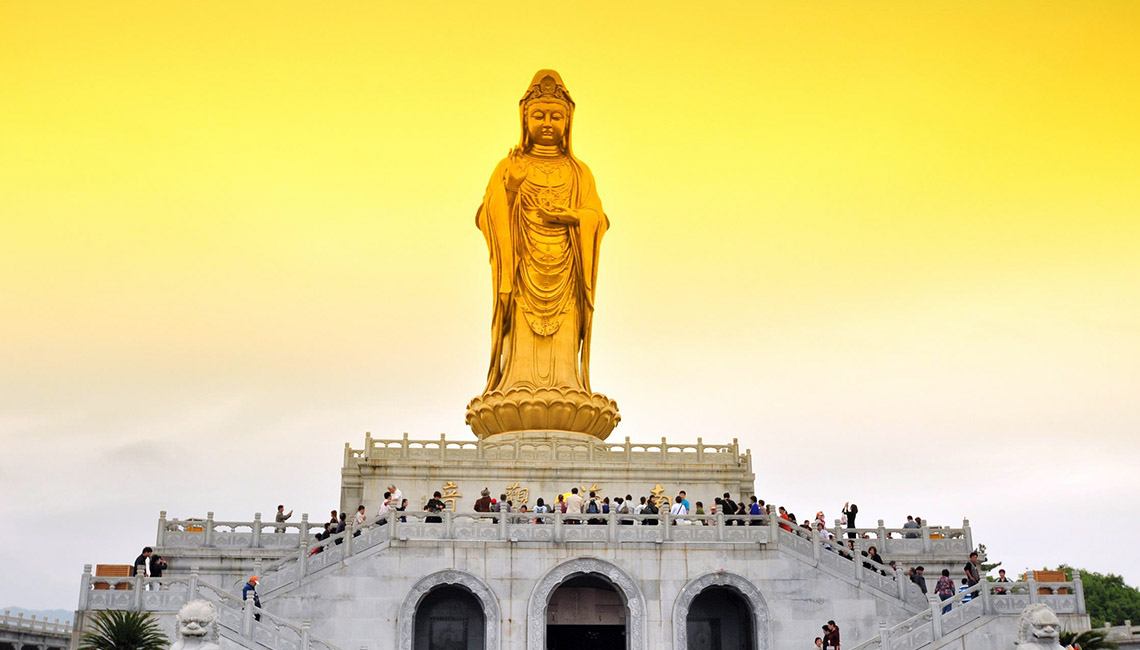Reply To:
Name - Reply Comment
 Mount Putuo, one of Buddhism's four sacred mountains, has undergone a dramatic transformation under the Chinese Communist Party (CCP), evolving from a revered spiritual sanctuary to a commercialized tourist attraction. Once a site of profound religious significance dating back to the Tang Dynasty, the island now symbolizes the commodification of faith. With over 10 million tourists generating billions in revenue annually, religious activities are closely monitored by the Buddhist Association for China (BAC), the CCP’s religious overseer. The peak of commercialization came in 2018 when the CCP sought to list the Mount Putuo Tourism Development Company on the stock market. The attempt was halted only after widespread Buddhist protests.
Mount Putuo, one of Buddhism's four sacred mountains, has undergone a dramatic transformation under the Chinese Communist Party (CCP), evolving from a revered spiritual sanctuary to a commercialized tourist attraction. Once a site of profound religious significance dating back to the Tang Dynasty, the island now symbolizes the commodification of faith. With over 10 million tourists generating billions in revenue annually, religious activities are closely monitored by the Buddhist Association for China (BAC), the CCP’s religious overseer. The peak of commercialization came in 2018 when the CCP sought to list the Mount Putuo Tourism Development Company on the stock market. The attempt was halted only after widespread Buddhist protests.
The once-sacred spaces now feature luxury spas, gift shops offering mass-produced religious souvenirs, and a pilgrimage route designed solely to maximize tourist numbers. The island’s origin story has been rewritten to align with nationalist propaganda, positioning China as the rightful center of Buddhism. The pilgrimage routes, once a journey of spiritual significance, are now replaced by mass transportation options to accommodate the growing tourist traffic. Even religious items are sold as cheap trinkets, including "Guanyin cake," reducing the sacredness of Buddhist legends to a marketing ploy.
Even more concerning is the CCP’s historical revisionism. The island’s history has been altered to minimize its connections with Japan and present China as the true center of Buddhism. State media increasingly portrays Tibetan Buddhist practices as inferior to Chinese traditions. This strategy aims not only to strengthen Chinese influence but to undermine Tibetan cultural and religious identity by delegitimizing Tibetan Buddhism.
The commercialization of Mount Putuo has had a profound impact on authentic Buddhist practice. Monks and pilgrims now find themselves marginalized in a space dominated by tourists. Rising entry fees and the overwhelming commercialization hinder the contemplative spiritual practices that once defined the mountain. This transformation is not an isolated incident but part of a broader CCP strategy to control Buddhist discourse and use religious heritage as a geopolitical tool. Despite being an officially atheist state, China now claims to be the global guardian of Buddhism.
China's recent announcement to host the “6th Buddhist Council” is a clear example of historical appropriation, attempting to align itself as the global custodian of Buddhism despite its atheist stance. Through strategic religious diplomacy, China strengthens ties with Buddhist-majority nations while whitewashing its human rights violations and undermining Tibetan Buddhism.
Through this religious diplomacy, China seeks to portray itself as the protector of Buddhism, using cultural soft power to expand its political influence across Asia. However, the reality at home is starkly different. While China projects an image of spiritual sophistication abroad, it continues to dismantle Buddhist institutions domestically. In Tibet and Xinjiang, the CCP has engaged in widespread religious repression, including the destruction of monasteries and the detention of religious figures, actions that directly contradict the image China seeks to project as Buddhism’s protector.
Mount Putuo stands as a warning about the fate of religious heritage under authoritarian rule. The CCP’s approach to this sacred site, disguised as cultural preservation, has stripped it of its spiritual essence. Once a sanctuary for pilgrims, it has become a stage for the Party’s political agenda, driven by profit, power, and control. The manipulation of Mount Putuo and China’s broader Buddhist diplomacy strategy illustrates how religious traditions can be reshaped for political gain. While this strategy may advance China’s geopolitical interests, it also highlights the cynical ways in which the CCP manipulates religious heritage, claiming to preserve it while actively undermining its authentic expression.